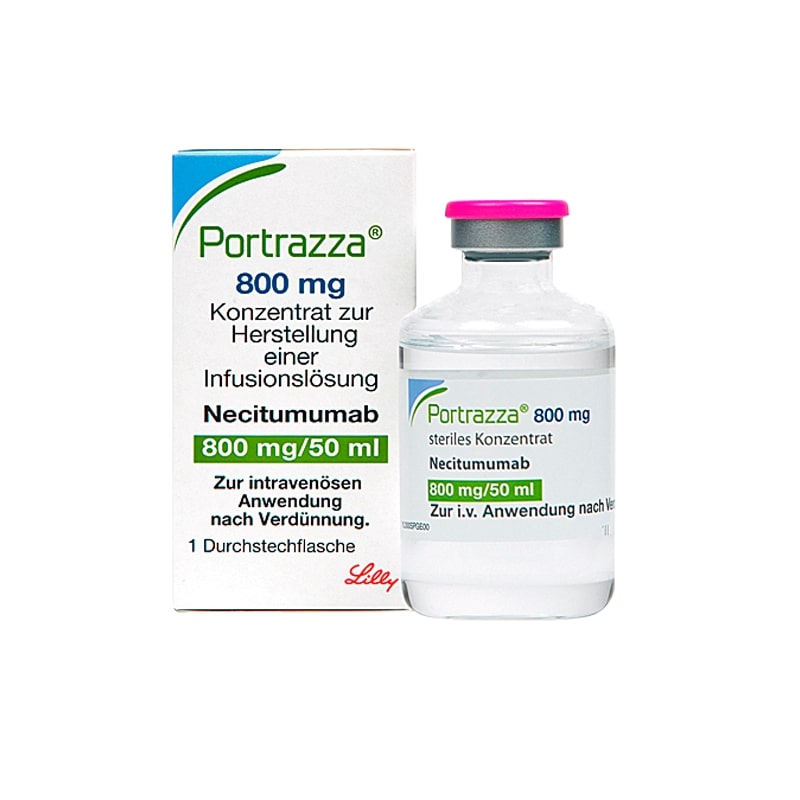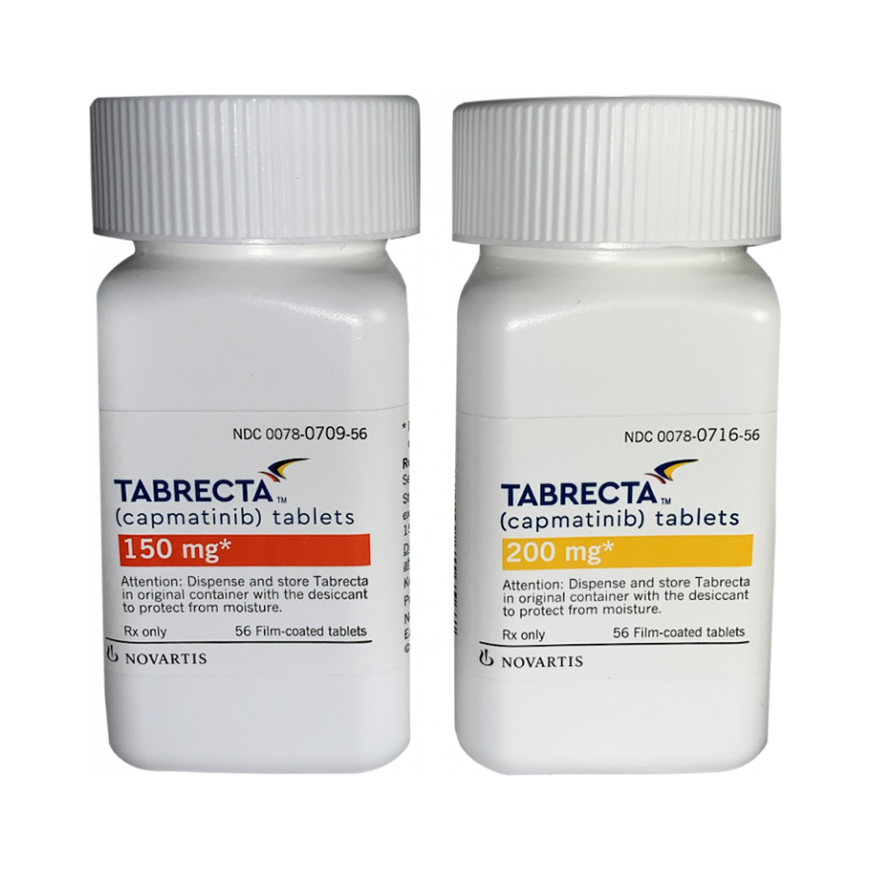Portrazza (necitumumab) vs Tabrecta (capmatinib)
Portrazza (necitumumab) vs Tabrecta (capmatinib)
Portrazza (necitumumab) is a monoclonal antibody designed to target and block the epidermal growth factor receptor (EGFR), which is often overexpressed in certain types of lung cancer, specifically squamous non-small cell lung cancer (NSCLC). It is used in combination with chemotherapy as a first-line treatment for patients with metastatic squamous NSCLC. On the other hand, Tabrecta (capmatinib) is a small molecule kinase inhibitor that targets the MET gene, including mutations leading to exon 14 skipping, and is used for the treatment of adult patients with metastatic NSCLC who have specific genetic alterations known as MET exon 14 skipping mutations. When deciding between these two medications, it is crucial for the patient to undergo biomarker testing to determine the presence of either EGFR overexpression or MET exon 14 skipping mutations in their cancer cells, as this will dictate which medication is appropriate for their specific type of lung cancer.
Difference between Portrazza and Tabrecta
| Metric | Portrazza (necitumumab) | Tabrecta (capmatinib) |
|---|---|---|
| Generic name | Necitumumab | Capmatinib |
| Indications | Metastatic squamous non-small cell lung cancer (NSCLC) | Metastatic non-small cell lung cancer (NSCLC) with MET exon 14 skipping mutations |
| Mechanism of action | Epidermal growth factor receptor (EGFR) antagonist | Mesenchymal-epithelial transition (MET) inhibitor |
| Brand names | Portrazza | Tabrecta |
| Administrative route | Intravenous infusion | Oral |
| Side effects | Rash, magnesium deficiency, venous thromboembolism | Nausea, vomiting, edema, muscle and joint pain |
| Contraindications | Hypomagnesemia, hypersensitivity to necitumumab or its excipients | Hypersensitivity to capmatinib or any of its excipients |
| Drug class | Monoclonal antibody | Small molecule kinase inhibitor |
| Manufacturer | Eli Lilly and Company | Novartis Pharmaceuticals |
Efficacy
Efficacy of Portrazza (necitumumab) in Lung Cancer
Portrazza (necitumumab) is a monoclonal antibody designed to target the epidermal growth factor receptor (EGFR), which is often overexpressed in certain types of lung cancer. Specifically, it has been approved for use in combination with gemcitabine and cisplatin for the first-line treatment of patients with metastatic squamous non-small cell lung cancer (NSCLC). Clinical trials have demonstrated that the addition of necitumumab to chemotherapy can improve overall survival in this patient population. However, it is important to note that Portrazza is not indicated for the treatment of non-squamous NSCLC or for patients whose tumors have EGFR or anaplastic lymphoma kinase (ALK) genomic tumor aberrations.
Efficacy of Tabrecta (capmatinib) in Lung Cancer
Tabrecta (capmatinib) is a kinase inhibitor that targets the MET gene, including the MET exon 14 skipping mutation. This mutation can lead to cancer growth and can be present in non-small cell lung cancer (NSCLC). Capmatinib has shown efficacy in treating patients with metastatic NSCLC that have alterations in the MET gene. The approval of Tabrecta was based on the overall response rate and duration of response seen in clinical trials. Patients treated with Tabrecta demonstrated a significant reduction in tumor size, and the drug was granted accelerated approval by the FDA for its promising clinical benefit in this specific patient population.
Both Portrazza and Tabrecta represent significant advancements in the treatment of lung cancer, offering targeted therapies that are tailored to the genetic profile of a patient's tumor. These treatments underscore the importance of molecular testing in the management of lung cancer, as they are effective only in the presence of specific genetic alterations. The efficacy of these drugs highlights the shift towards personalized medicine in oncology, where treatments are increasingly based on the individual characteristics of a patient's cancer.
While these drugs have shown promise, it is crucial for healthcare providers to consider the overall health status of the patient, potential side effects, and the specific molecular characteristics of the lung cancer when determining the most appropriate treatment regimen. As with all medications, the efficacy of Portrazza and Tabrecta must be weighed against potential risks and monitored closely throughout the treatment process.
Regulatory Agency Approvals
Portrazza
-
European Medical Agency (EMA), European Union

-
Food and Drug Administration (FDA), USA

-
Health Canada

Tabrecta
-
European Medical Agency (EMA), European Union

-
Food and Drug Administration (FDA), USA

-
Pharmaceuticals and Medical Devices Agency (PMDA), Japan

Access Portrazza or Tabrecta today
If Portrazza or Tabrecta are not approved or available in your country (e.g. due to supply issues), you can access them via Everyone.org.
How it works

Make an enquiry
Choose the medicine you want to buy, answer a couple of questions, and upload your prescription to speed things up. We’ll get back to you within 24 hours.


Make an enquiry
Choose the medicine you want to buy, answer a couple of questions, and upload your prescription to speed things up. We’ll get back to you within 24 hours.


Breeze through the paperwork
We'll guide you through the required documents for importing unapproved medicine, ensuring you have all the necessary information.


Get a personalized quote
We’ll prepare a quote for you, including medicine costs and any shipping, administrative, or import fees that may apply.


Receive your medicine
Accept the quote and we’ll handle the rest - sourcing and safely delivering your medicine.

Some text on this page has been automatically generated. Speak to your physician before you start a new treatment or medication.
Let's talk
If you have any questions, call us or send us a message through WhatsApp or email:
Contact us




